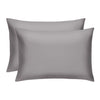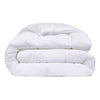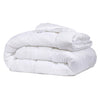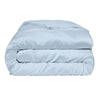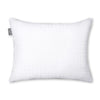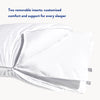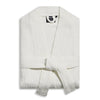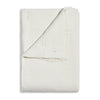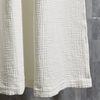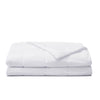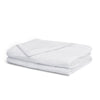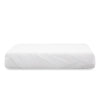The Daily Miracle
Microfiber vs Cotton Sheets for Your Bed
Published
September 04, 2023
Author
Nicholas Crusie

When you slip into bed after a long day, the fabric enveloping you should provide ultimate comfort, enhancing your sleep. The type of bed sheets you choose can significantly influence your sleep quality, making the decision between microfiber and cotton sheets an important one.
It’s best to break up all of the little decisions you have to make before you commit to a new bedding set into a series of smaller decisions. And one of those smaller, fundamental decisions you have to make is about the material of your sheets.
Cotton and microfiber are two well-loved and well-known options … but do you know the difference between these two materials?
You may ask, “Are microfiber sheets good?” or “Are cotton sheets better?” While both have merits, each fabric carries unique characteristics that might make one more suitable for you. And since you spend nearly one-third of your life sleeping, it’s important that your bed is comfortable!
To help make your evening routine that little bit easier, let’s break down everything you need to know about microfiber vs cotton bed sheets.
What Are Microfiber Sheets?
In the conversation around microfiber vs cotton bed sheets, we first must look closely at microfiber. Microfiber sheets are a product of modern innovation.
Microfiber is no stranger to modern households. Known for its exceptional softness, this synthetic material often consists of finely woven threads that create a smooth, velvety surface. Crafted from ultra-thin polyester and nylon fibers, microfiber sheets provide a plush and luxurious feel that's highly appealing.
They're crafted from finely-woven , typically polyester, fibers which gives them their name — microfiber. These sheets are praised for their soft, smooth texture, providing an enticing invitation to the land of dreams.
So, are microfiber sheets good? Microfiber sheets come with an array of benefits. The ultra-fine threads result in a fabric that's exceptionally soft to the touch, a feature many sleepers find appealing.
Additionally, microfiber is generally more affordable than high-quality cotton sheets, making it an attractive choice for those on a budget. Its tightly woven structure gives it a wrinkle-resistant quality, making it an appealing choice for those who prefer low-maintenance bedding.
On the other hand, the same characteristic might reduce breathability, leading some sleepers to find the sheets overly warm. Unlike natural fibers like cotton, synthetic materials tend to trap heat, leading to a warmer sleep environment.
Additionally, concerns regarding sustainability arise with microfiber, as it is petroleum-based, which can lead to a higher environmental impact compared to natural fibers.
Additionally, despite their wrinkle-resistant trait, which makes even fitted sheet folding a bit easier, microfiber sheets might not match the durability of some quality cotton sheet variants, meaning they may require replacement more frequently.
But that's just the tip of the iceberg. Microfiber varies in quality, with different grades offering unique touches. While high-quality microfiber can mimic the feel of soft silk, cheaper options might feel less inviting. It's a world filled with options and considerations, all bundled into this complex, synthetic fabric.
Are Microfiber Sheets Hot?
A common question in the microfiber vs. cotton debate isn’t just “Are microfiber sheets good?” but "Are microfiber sheets hot?" Unfortunately, the answer tends to lean toward the affirmative.
As a synthetic material, microfiber lacks the moisture-wicking properties found in cotton. This means microfiber sheets often retain body heat rather than release it, leading to an uncomfortably warm sleep environment.
This can be particularly problematic for hot sleepers or those prone to night sweats, as the lack of breathability may exacerbate these issues. In fact, in the argument about microfiber vs cotton sheets, this heat-trapping characteristic can cause an increase in bedroom bacteria, possibly contributing to skin conditions like acne or exacerbating allergies.
While microfiber sheets may seem to have their perks, it's crucial to consider these drawbacks for a restful, refreshing night's sleep. As you ponder your choices of microfiber vs cotton sheets, remember the role of breathability and thermoregulation in promoting a healthy sleep environment. Perhaps, in this light, natural fiber sheets might hold a more appealing allure.
Are Microfiber Sheets Good?
Microfiber sheets do offer some advantages in the microfiber vs cotton bed sheets debate that can be appealing to certain sleepers. They're soft and lightweight and provide a cozy feel that some find irresistible.
Additionally, they’re low maintenance — easy to wash and quick to dry, coupled with their wrinkle-resistant quality, can make bed-making a breeze.
However, the drawbacks of microfiber vs cotton sheets are significant enough to warrant serious consideration before you commit! The major con is their lack of breathability — their propensity to trap heat can lead to a less comfortable, warmer sleep environment.
Also, the overall durability and lifespan of microfiber sheets may not compare favorably with high-quality cotton. Not to mention, cotton sheets are just softer! But we’ll cover that more in the next section.
|
Pros |
Cons |
|
Soft and lightweight |
Traps heat |
|
Low maintenance |
Less durable |
|
Wrinkle-resistant |
Synthetic, so less eco-friendly |
What Are Cotton Sheets?
Cotton sheets, on the other hand, are made from the natural fibers of cotton plants, making them a classic and popular choice in the microfiber vs cotton bed sheets debate. Cotton is recognized for its breathability, absorbency, and durability, making it suitable for all-season use.
The benefits of cotton sheets are manifold. Their breathability contributes to a cooler, more comfortable sleeping environment, which is especially beneficial for those who tend to sleep hot.
The strength of cotton fibers means that with proper care, these sheets can last for years. Furthermore, as a natural material, cotton is hypoallergenic, a trait those with sensitive skin or allergies value.
Nevertheless, cotton sheets also come with their share of cons. They are prone to wrinkling and may require more care to maintain their fresh and smooth look.
High-quality cotton sheets, such as Egyptian or Pima cotton, can also be pricey, making them an investment piece. That said, there are few places in your home that are more worth the investment than your bedding.
|
Pros |
Cons |
|
Breathable and absorbent |
May wrinkle more easily than synthetics |
|
Durable |
High quality means higher price point |
|
Hypoallergenic |
Are Cotton Sheets Cool?
Yes, cotton sheets are indeed cool, both literally and figuratively! Their natural breathability allows air to circulate more freely, preventing heat build-up and promoting a cool, comfortable sleep environment. This feature makes cotton sheets especially suitable for hot sleepers or those prone to night sweats — and often is the deciding factor in the microfiber vs cotton bed sheets decision.
Moreover, innovations in bedding, such as Miracle Brand’s blend of eucalyptus cotton with silver, take the cooling feature a notch higher. These sheets not only offer the breathability and comfort of cotton but also incorporate the cooling properties of eucalyptus and the antimicrobial benefits of silver.
This blend results in sheets that stay fresh for longer and offer a uniquely relaxing, cool night’s sleep. If you hate getting to the “wash your sheets” bullet point on your to-do list, these silver-infused sheets can really help by cutting down on odors and bacteria and how many times a week or month you have to wash your bedding.
Microfiber vs. Cotton: The Showdown
Comparing microfiber and cotton is a multifaceted task, and really, it all comes down to how you sleep and your individual priorities and needs. Microfiber, made from finely woven synthetic fibers, offers a soft touch and usually comes with a more budget-friendly price tag.
Its resilience to wrinkles and easy-care nature makes it a popular choice among busy households. Some consumers also appreciate that microfiber is hypoallergenic, as it tends to repel dust mites and other allergens.
In contrast, cotton's natural absorbency and breathability can offer a cooler sleep experience, especially during hot summer nights. Its natural fibers provide a crisp and fresh feeling.
When comparing microfiber vs cotton sheets, durability, cost, and sustainability also come into play, presenting a complex picture that goes beyond mere appearance or feel. Cotton sheets are often considered more environmentally friendly, especially when organically produced, and can last for years when cared for properly.
While microfiber caters to those seeking plush comfort and low maintenance, cotton's timeless elegance and natural qualities may appeal to a more traditional sensibility. But the comparison doesn't end there; the type of weave, thread count, and even the finishing process can affect the final experience of the sheets, adding layers of complexity to this seemingly simple debate.
Factors such as percale or sateen weave, and whether the cotton is Egyptian, Pima, or upland, further influence texture, longevity, and overall comfort. These differences in weaving create distinct tactile experiences. The origin of the cotton also matters: Egyptian cotton, with its long fibers, offers exceptional softness and durability; Pima, known for its silk-like feel; and upland, which is widely available but not as soft.
Additionally, thread count, typically ranging from 200 to 800, plays a vital role in determining the fabric's quality, though it's not the sole indicator. Higher thread counts usually mean smoother and more luxurious sheets but can sometimes lead to misleading marketing practices.
Eucalyptus Sheets: A Sustainable and Luxurious Alternative
So, how do you choose bed sheets: microfiber vs cotton? Maybe there’s another option!
Maybe the answer to microfiber vs cotton bed sheets is actually eucalyptus. Enter the world of eucalyptus sheets, a remarkable innovation in bedding that marries luxury, comfort, and sustainability. Made from the wood pulp of sustainably sourced eucalyptus trees, these sheets offer a unique combination of beneficial properties.
Eucalyptus sheets boast incredible softness, rivaling that of high-thread-count cotton and surpassing microfiber. Their moisture-wicking capabilities and breathability make them an excellent option for temperature regulation, perfect for hot sleepers and those who experience night sweats.
But the benefits of eucalyptus sheets don't end at comfort; their sustainability profile is impressive. Eucalyptus trees are fast-growing and require less water than cotton plants, making these sheets a more environmentally friendly choice.
Miracle Brand takes the eucalyptus sheet game a step further by infusing our sheets with natural silver, which has hypoallergenic and antimicrobial properties. This means less frequent washing and water-saving, contributing even more to the sheets' eco-friendly credentials.
|
Pros |
Cons |
|
Incredible softness |
Can be expensive |
|
Moisture-wicking and breathable |
May require special care |
|
Environmentally friendly |
Cotton vs Microfiber Sheets Comparison Table
|
Cotton Sheets |
Microfiber Sheets |
Eucalyptus Sheets |
|
|
Softness |
High |
High |
Highest |
|
Breathability |
High |
Low |
High |
|
Durability |
High |
Medium |
High |
|
Hypoallergenic |
Yes |
No |
Yes |
|
Care |
Medium |
Easy |
Medium |
|
Price |
High |
Low |
High |
|
Environmental Impact |
Medium |
Low |
High |
Conclusion: Microfiber Sheets vs Cotton, Which Is Better?
When deciding between microfiber and cotton sheets, it comes down to personal preference, budget, and sleep needs. While microfiber offers low maintenance and affordability, it may not provide the same level of breathability and durability as cotton. Conversely, cotton sheets are breathable, durable, and hypoallergenic but may have a heftier price tag and need more care.
However, if you're looking for the best of both worlds — luxurious comfort, breathability, and a sustainable choice — the eucalyptus-based sheets from Miracle Brand are a real cover-all-of-your-bases solution.
These sheets, infused with silver, provide an unparalleled sleep experience while catering to your eco-conscious side.
Sources:
Sleep Statistics | Sleep Foundation
Health Hazards When You Don’t Wash Your Sheets | WebMD
Microfiber Pollution in the Earth System | National Library of Medicine
What Is Cotton | Learn Genetics
What Is Egyptian Cotton? | Bed Guides
US Cotton’s Sustainability | National Cotton Council


